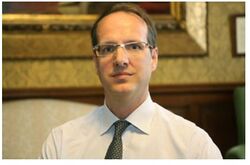Difference between revisions of "UK/Ambassador/Libya"
m (add image) |
(history) |
||
| Line 10: | Line 10: | ||
As of 2014 the British Embassy in Tripoli suspended operations due to the civil war in Libya following the British-supported regime change in 2011. The ambassador and staff operate from Tunisia for the time being.<ref>[https://www.theguardian.com/world/2014/aug/02/british-embassy-withdraws-libya-attacks-ambushes Britain to close embassy and withdraw staff from Libya], ''The Guardian'', London, 2 August 2014</ref> | As of 2014 the British Embassy in Tripoli suspended operations due to the civil war in Libya following the British-supported regime change in 2011. The ambassador and staff operate from Tunisia for the time being.<ref>[https://www.theguardian.com/world/2014/aug/02/british-embassy-withdraws-libya-attacks-ambushes Britain to close embassy and withdraw staff from Libya], ''The Guardian'', London, 2 August 2014</ref> | ||
| + | |||
| + | |||
| + | ==History== | ||
| + | After the end of Italian colonial rule after [[World War 2]], Britain installed [[King Idris]]. Under Idris, Libya maintained a close relationship with the UK even after their relations with other Arab nations soured due to the [[1956 Suez Crisis]].<ref>https://www.smh.com.au/politics/federal/gaddafi-an-extremist-but-he-was-not-mad-20111027-1mm4z.html</ref> | ||
| + | |||
| + | Relations after [[Muammar Gaddafi]]'s 1969 takeover were extremely poor. | ||
| + | |||
| + | Poor relations were reinforced by direct confrontations such the [[1986 United States bombing of Libya]] and the destruction of [[Pan Am Flight 103]], where Libya was framed for political reasons. | ||
| + | |||
| + | Diplomatic relations were broken under the pretext of the murder of WPC [[Yvonne Fletcher]] in [[1984]] - a false flag incident. | ||
| + | |||
| + | Britain and Libya resumed diplomatic relations in July 1999. | ||
| + | |||
| + | Despite these setbacks, relations began to improve during the 1990s, and peaked in December 2003 when Libya announced that they would abandon their [[weapons of mass destruction]] programmes. UK Prime Minister [[Tony Blair]] then travelled to [[Tripoli]], met with Gaddafi and declared a "new relationship" between the countries.<ref>http://news.bbc.co.uk/1/hi/uk_politics/3566545.stm</ref> | ||
| + | |||
| + | Behind the scenes, Britain's effort to topple the government continued, and it was one of the main backers of the 2011 regime change and following NATO aerial bombing campaign. | ||
{{SMWDocs}} | {{SMWDocs}} | ||
==References== | ==References== | ||
{{reflist}} | {{reflist}} | ||
Latest revision as of 08:18, 7 March 2024
(Ambassador to Libya) | |
|---|---|
 Martin Reynolds was ambassador to Libya for six months, possibly involved in deep state activities in the chaotic country, before becoming Principal Private Secretary to the Prime Minister Boris Johnson | |
| Start | 1952 |
| The United Kingdom's foremost diplomatic representative in Libya, | |
The Ambassador of the United Kingdom to Libya is the United Kingdom's foremost diplomatic representative in Libya, and head of the UK's diplomatic mission in Tripoli.
As of 2014 the British Embassy in Tripoli suspended operations due to the civil war in Libya following the British-supported regime change in 2011. The ambassador and staff operate from Tunisia for the time being.[1]
History
After the end of Italian colonial rule after World War 2, Britain installed King Idris. Under Idris, Libya maintained a close relationship with the UK even after their relations with other Arab nations soured due to the 1956 Suez Crisis.[2]
Relations after Muammar Gaddafi's 1969 takeover were extremely poor.
Poor relations were reinforced by direct confrontations such the 1986 United States bombing of Libya and the destruction of Pan Am Flight 103, where Libya was framed for political reasons.
Diplomatic relations were broken under the pretext of the murder of WPC Yvonne Fletcher in 1984 - a false flag incident.
Britain and Libya resumed diplomatic relations in July 1999.
Despite these setbacks, relations began to improve during the 1990s, and peaked in December 2003 when Libya announced that they would abandon their weapons of mass destruction programmes. UK Prime Minister Tony Blair then travelled to Tripoli, met with Gaddafi and declared a "new relationship" between the countries.[3]
Behind the scenes, Britain's effort to topple the government continued, and it was one of the main backers of the 2011 regime change and following NATO aerial bombing campaign.
Office Holders on Wikispooks
| Name | From | To |
|---|---|---|
| Martin Reynolds | April 2019 | September 2019 |
| Frank Baker | 2018 | 2019 |